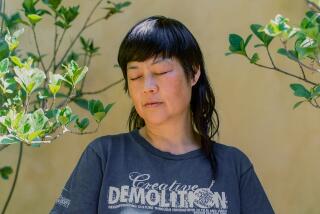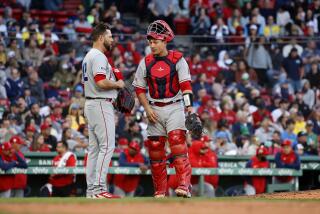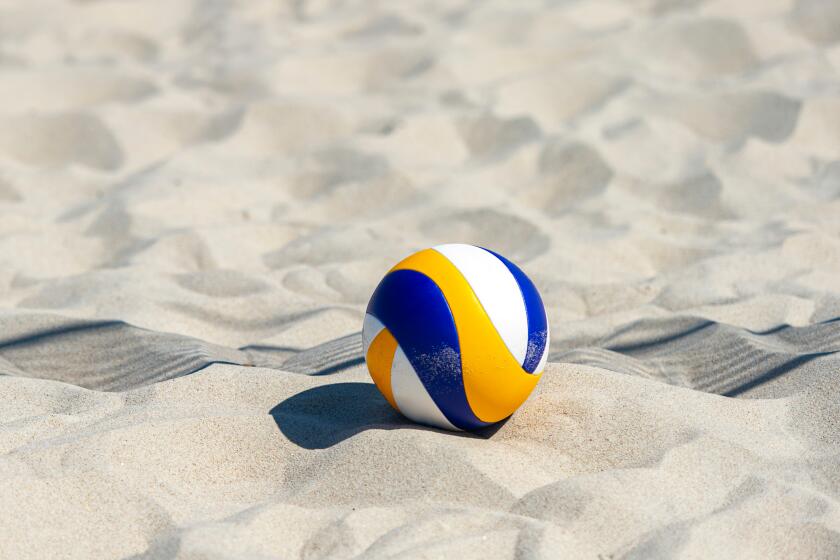He’s Just Chang, Which Is Plenty
- Share via
A guy like Michael Chang is as necessary to tennis as a net.
Not everybody can be Pete Sampras, Bjorn Borg, Jimmy Connors--or even Bill Tilden, Rod Laver or J. Donald Budge. Somebody has to keep them honest. And on their toes.
They used to call guys like Michael “trial horses” in the fight game. Or “strictly an opponent.”
An “opponent” had to be good but not great. He had to hit hard but not too hard. He had to be crafty, a skilled survivalist. The slightest slip and he had you.
Every sport has them. Every sport needs them. The Indy race driver in the little underpowered car who makes the grid year after year, driving on the edge, waiting for a miscue in front of him. Then, one year, he’d make his dream. Gordon Johncock comes to mind.
The baseball player who had to “hit ‘em where they ain’t.” The wide receiver who had to get open any way he could because he didn’t have Jerry Rice-type speed. The basketball player who was only 5 feet 11. The golfer who had to win with his short game.
Michael was all of the above. And he was all on his own. God or nature didn’t give him much to work with. God made Pete Sampras a tennis player with those long arms, that violent serve and long loping legs. God apparently thought Michael was going to be a second baseman.
He didn’t even get the disposition. God made Andre Agassi as mean as a snake. He gave John McEnroe a snarl and a pout. Michael doesn’t even raise his voice. Or his fist. He’s as poker-faced as a guy with four aces looking at a full house.
You measure greatness in tennis by Grand Slams, the four national tournaments staged when the whole world is looking on. Michael won one--the French Open--when he was only 17. He thinks now he probably didn’t understand the situation. They thought he was the ball boy. He didn’t know he wasn’t supposed to beat Ivan Lendl and Stefan Edberg. So, he did. He hasn’t won a Grand slam since.
But Michael wasn’t content with that role. What separates Chang from other chronic mid-seeded players of tennis history is his utter undiscourageability. He won’t accept mediocrity. It’s just another serve he has to return. Where other players might win using only the interest on their talent, Michael has to dip into the principal every time. He’s like a fighter who fights you three minutes of every round, a ballplayer who has a “good at-bat” every time.
If he had a 36-inch sleeve, he’d never have a so-so Wimbledon as some more gifted past champions seem to throw in. In fact, if they didn’t have the tie-breaker in tennis, he might never lose. He is the master of the five-hour match. He treats every shot as if it were match-point.
He already is one of the great players of history but he sees no reason why he can’t become one of the greatest. If grit and heart can do what a 110-mph serve won’t, he can’t miss.
His game is spectacularly unsuited to Wimbledon--he comes to the net only to shake hands after it’s over--but Michael thinks he’s just pressing too much.
Opponents groan when they get him in the draw. “Like hitting against a barn door, the ball always comes back,” complained Sampras once.
He won’t leave little enough alone. Arms too short? Michael got a longer racket. Serve too slow? Michael worked till he beefed it up to 124-mph at Indian Wells where he won in March.
But hold the sad songs. Michael has earned $12.5 million on the court. He has won 25 career titles, two of them this year. They’re not Grand Slams, but the bank doesn’t care.
He is playing the best tennis of his career. Last year, he was afinalist in the French Open (he lost to Thomas Muster) and this year he was a finalist in the Australian (he lost to Boris Becker). Those were the first Grand Slam finals he reached since he won the French in 1989.
The road to the championship goes through Chang-town, so to speak.
Michael has been shocking the tennis insiders at the Infiniti Open at UCLA all this week, winning in straight sets, not a Chang specialty, getting service aces, playing the surface like a violin.
He drew an old familiar adversary in the semifinal--Stefan Edberg. The Swede with the smorgasbord game who had won two Wimbledons, two U.S. Opens, and two Australian Opens.
Edberg and Chang used to have these long wars of attrition, more marathon runs than tennis matches. They played for 5 hours 27 minutes once, longest match in U.S. Open history. They played for 4:37 in a French Open once. You brought a lunch when they played. Or a breakfast.
That was then, this is now. Edberg is on his farewell tour. Though only 30, he has lost a step. He also said he has “lost my motivation.” Against Chang, you might as well lose your arm. Unmotivated, against Chang, you’re better off blindfolded. Edberg sank without a trace, 6-3, 6-2.
Michael Chang is used to outlasting his opposition, on the court and on the calendar, chronologically as well as athletically. As Milton said, they also serve who only stand and wait. And, with Michael, as the serve gets faster, the wait gets shorter--only straight sets.
More to Read
Go beyond the scoreboard
Get the latest on L.A.'s teams in the daily Sports Report newsletter.
You may occasionally receive promotional content from the Los Angeles Times.










